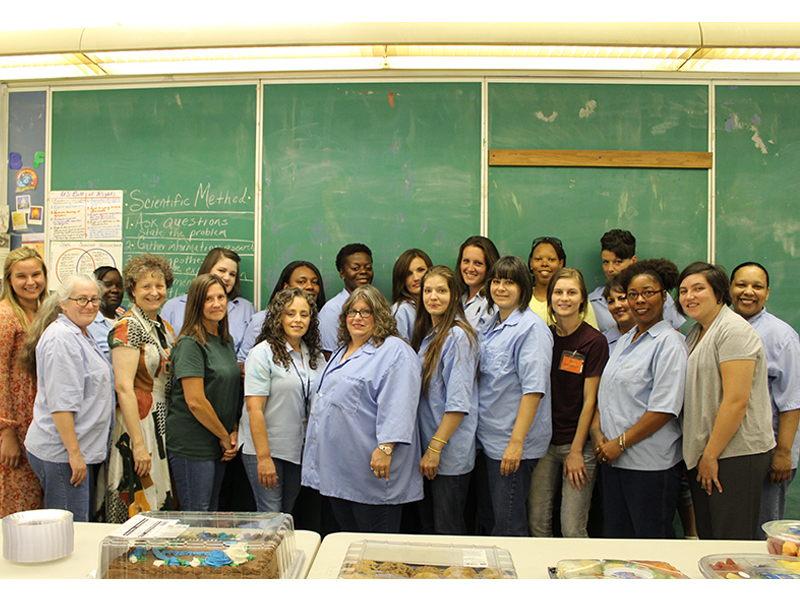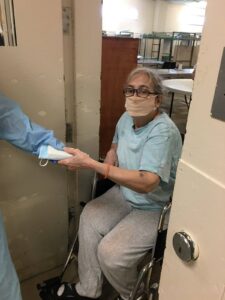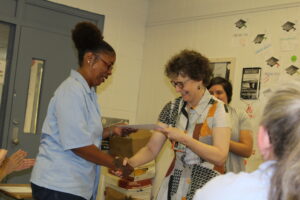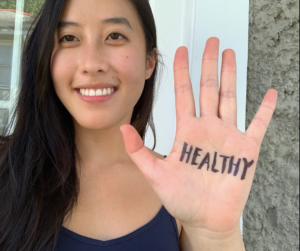Tulane Community, Local Organizations Lead Effort to Support Incarcerated Women
By Katie Small
This article was originally published in Tulane Today on June 23, 2020.

The College in Prison Program (CPP) represents Tulane’s dual commitment to diversity and excellence, extending high-quality, rigorous postsecondary education to incarcerated women. The CPP also embodies Tulane’s efforts to forge strong connections with community partners beyond the confines of campus. The program is a collaboration among the Newcomb Institute, the School of Professional Advancement, and Operation Restoration, a nonprofit for currently and formerly incarcerated women and girls.
The program offers women in prison the opportunity to take courses required to complete a bachelor’s degree and allows Tulane undergraduate students enrolled in the sociology course “Women’s Imprisonment” to earn service-learning credit by tutoring LCIW students, and gather research material for their sociology term papers.
The COVID-19 pandemic abruptly interrupted the College in Prison Program and the LCIW students’ courses. Social distancing measures and lack of internet access have required instructors to communicate with their students through printed correspondence that is assembled and delivered to the prison each week.
 Overcrowding, limited access to health care and the inability to practice social distancing have put incarcerated people at a substantial risk of contracting COVID-19. Nationwide, 44,000 incarcerated people and prison staff have been infected; 462 have died.
Overcrowding, limited access to health care and the inability to practice social distancing have put incarcerated people at a substantial risk of contracting COVID-19. Nationwide, 44,000 incarcerated people and prison staff have been infected; 462 have died.
Advocacy groups have called attention to the inherent public health risks in overcrowded prisons where close contact cannot be avoided. Louisiana’s imprisonment rate, the highest per capita in the world, puts the state at even greater risk. In the LCIW system, 85 percent of the roughly 200 women housed in the female dorms at the Elayn Hunt location have tested positive for the virus. Like the women at LCIW-Hunt, women at Jetson, another LCIW location, are in jeopardy. Many of the inmates suffer from high rates of underlying health conditions such as diabetes, and they also sleep in crowded dormitories with shared ventilation systems.
Despite the new logistical challenges presented by the pandemic, the CPP has continued to serve incarcerated women, aided by a growing network of support, both on campus and beyond. The Newcomb Institute, working with local nonprofit Operation Restoration and Tulane Law School’s Women’s Prison Project, has petitioned to secure immediate release for women who have received favorable recommendations from the pardon and parole boards. Ongoing efforts made through Operation Restoration’s Safety and Freedom Fund also involve bailing women out — including one COVID-19 positive woman who just gave birth — and providing additional services for women who have secured release.

Sally Kenney and Sherie Simms
Tulane faculty and staff from a variety of disciplines have stepped up to aid the CPP in its efforts. Tulane Medical School Dean Dr. Lee Hamm and COO Dan Castillo have secured donations to provide the LCIW with personal protective equipment, including thermometers, homemade masks and gowns. Development officers Laura DeCuir and Christine Carr recently secured a Capital One grant to provide $2,500 for additional PPE and cleaning supplies.
“The level of support and interest has been astounding, and has led to new partnerships across the university,” said Newcomb Institute Executive Director Sally J. Kenney. Kenney reached out to her colleagues at Tulane’s School of Public Health and Tropical Medicine, including Associate Dean Patty Kissinger, Associate Professor Katherine Andrinopolous, and Professor David Seal; they connected her with Tulane student Lauren Nguyen.

Tulane student Lauren Nguyen, MD/MPH Candidate 2023
“Lauren had just applied for grant money to bring food and cleaning supplies to the client base of Operation Restoration and First72+, who offered considerable guidance on the grant,” Kenney said. When her grant application was not successful, Nguyen reached out to Hongbing Liu, School of Medicine professor and president of the New Orleans Chinese Association, and Bruce Gibb of the Department of Chemistry. Liu donated 1,000 surgical masks and KN95 respirators, and Gibb donated 15 gallons of medical-grade disinfectant.
Nguyen was then granted $500 from a one-time COVID-19 relief fund through her membership with Voice of the Experienced, a local criminal justice reform organization. She used the money to purchase 200 bottles of hand sanitizer from local distillery-turned-hand sanitizer factory Lula Distillery. Upon learning of Nguyen’s mission to serve women in prison, Lula generously donated an extra 50 bottles of hand sanitizer.
Additional Tulane students have joined the effort, including graduating seniors Vid Raturi and Daniel Goldstein. Through their involvement with the student organizations Newcomb Prison Project and the Tulane American Medical Women’s Association, Raturi and Goldstein secured funding that has been used to purchase bars of soap for each incarcerated woman at LCIW’s Hunt and Jetson locations.
Operation Restoration also held a fundraiser to purchase more soap for women at LCIW. “People often forget that women and girls are incarcerated during this pandemic, too,” said Operation Restoration Executive Director Syrita Steib. “We want to express our heartfelt appreciation to the Tulane community for stepping up in this time of need. You never know where help is going to come from, but we are grateful we can rely on our university partners.”
The organizations continue to apply for further grant funding and are seeking the community’s support in their efforts. Donations can be made to the Newcomb Institute to purchase necessary technology to offer online classes for LCIW’s Tulane students.
Gifts made to Operation Restoration will provide women with funding to post bail, support women who are released, and secure needed personal protective equipment for both the incarcerated women and the prison staff who interact with them on a daily basis.
Supporters can also sign a petition to Governor John Bel Edwards requesting that he accelerate the release of women who have already had a hearing, who have exemplary prison records or who have already served lengthy sentences, particularly those serving time for defending themselves against intimate partner violence.

Graduating seniors Vid Raturi and Daniel Goldstein secured funding that has been used to purchase a bar of soap for each incarcerated woman at Louisiana Correctional Institute for Women’s Elayn Hunt and Jetson locations.
